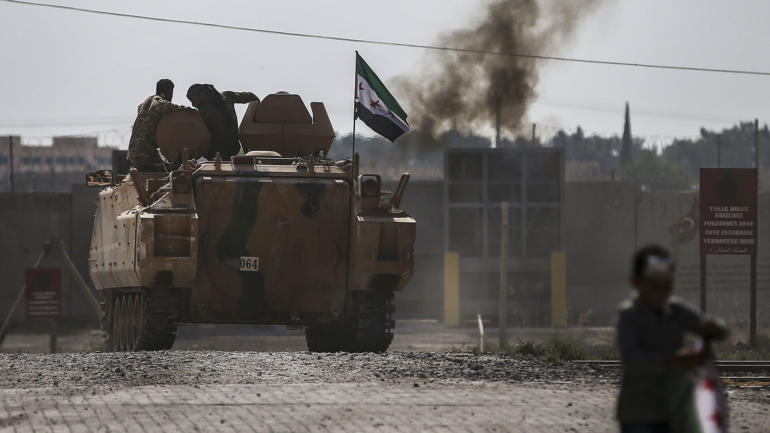Turkish troops have started allowing some aid workers to deliver food and medical supplies to Kurdish areas of Syria.
But Turkey’s President is vowing to crush any Kurdish militias after a truce ends.
CGTN’s Michal Bardavid reports.
With the assurance that U.S. troops would be leaving the region, Turkey decisively entered northern Syria on October 9.
The goal: clearing its border area of the Syrian Kurdish YPG that Ankara considers a terrorist organization but the U.S. considers an ally.
Days of intense fighting took place between Kurdish and Turkish forces and inside Syria.
On October 13, the U.S. is concerned that American troops would be caught in the middle and announced it would withdraw its remaining forces from the region.
Just four days later, U.S. officials traveled to Turkey and agreed with Ankara on terms that would allow the withdrawal of the YPG in five days’ time and if successful, result in Turkey halting its offensive.
But steps taken by the U.S. before the agreement might have larger implications for the region
When the U.S. decided to pull out its troops from the region the YPG was left with no protection, so it struck a deal with the Syrian government that led to the Syrian army’s deployment in keys town such as Manbij and Kobane.
This was a significant development. Syrian President Bashar Al-Assad’s forces haven’t been in control of towns like Manbij since 2012 when the rebels seized it.
The deal resulted in a major gain for the Syrian government, one that could change the course of the Syrian conflict.
Turkey’s President Tayyip Erdogan stated he was not concerned with the deployment of the Syrian army. However, some analysts stress that Ankara will soon face more consequences.
U.S. President Donald Trump seemed satisfied with the U.S. handling of the Turkish offensive
However, many critics, both in Turkey and the U.S., are criticizing Trump for inconsistencies, they say, will benefit Moscow.
The cease-fire agreement between the U.S. and Turkey appears to be largely holding for now, despite some reports of violations.
If the YPG does withdraw and Turkey then halts the offensive as promised, only then will the global leaders involved be able to take their next steps that will no doubt influence the region as a whole.
 CGTN America
CGTN America Turkish-backed Syrian opposition fighters on an armoured personnel carrier drive to cross the border into Syria, in Akcakale, Sanliurfa province, southeastern Turkey, Friday, Oct. 18, 2019. Fighting continued in a northeast Syrian border town at the center of the fight between Turkey and Kurdish forces early Friday, despite a U.S.-brokered cease-fire that went into effect overnight. (AP Photo/Emrah Gurel)
Turkish-backed Syrian opposition fighters on an armoured personnel carrier drive to cross the border into Syria, in Akcakale, Sanliurfa province, southeastern Turkey, Friday, Oct. 18, 2019. Fighting continued in a northeast Syrian border town at the center of the fight between Turkey and Kurdish forces early Friday, despite a U.S.-brokered cease-fire that went into effect overnight. (AP Photo/Emrah Gurel)
